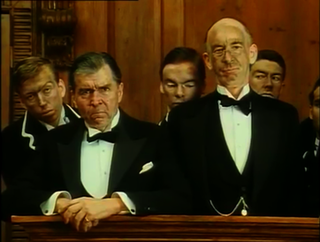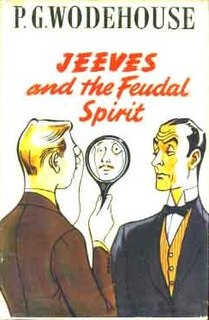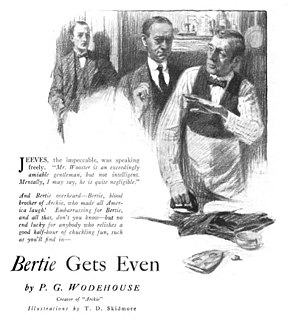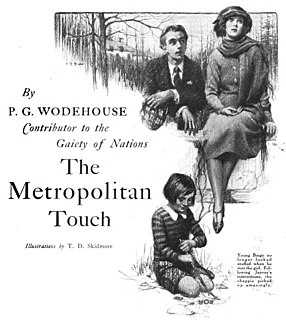| "Comrade Bingo" | |
|---|---|
 1922 Cosmopolitan illustration by T. D. Skidmore | |
| Author | P. G. Wodehouse |
| Country | United Kingdom |
| Language | English |
| Series | Jeeves |
| Genre(s) | Comedy |
| Publisher | The Strand Magazine |
| Media type | Print (Magazine) |
| Publication date | May 1922 |
| Preceded by | "Jeeves and the Chump Cyril" |
| Followed by | "The Great Sermon Handicap" |
"Comrade Bingo" is a short story by P. G. Wodehouse, and features the young gentleman Bertie Wooster and his valet Jeeves. The story was published in The Strand Magazine in London in May 1922, and then in Cosmopolitan in New York that same month. The story was also included in the 1923 collection The Inimitable Jeeves as two separate chapters, "Comrade Bingo" and "Bingo Has a Bad Goodwood". [1]

Sir Pelham Grenville Wodehouse was an English author and one of the most widely read humorists of the 20th century. Born in Guildford, the third son of a British magistrate based in Hong Kong, Wodehouse spent happy teenage years at Dulwich College, to which he remained devoted all his life. After leaving school, he was employed by a bank but disliked the work and turned to writing in his spare time. His early novels were mostly school stories, but he later switched to comic fiction, creating several regular characters who became familiar to the public over the years. They include the jolly gentleman of leisure Bertie Wooster and his sagacious valet Jeeves; the immaculate and loquacious Psmith; Lord Emsworth and the Blandings Castle set; the Oldest Member, with stories about golf; and Mr Mulliner, with tall tales on subjects ranging from bibulous bishops to megalomaniac movie moguls.

Bertram "Bertie" Wilberforce Wooster is a recurring fictional character in the comedic Jeeves stories created by British author P. G. Wodehouse. A young English gentleman and one of the "idle rich", Bertie frequently appears alongside his valet, Jeeves, whose intelligence manages to save Bertie or one of his friends from numerous awkward situations. As the first-person narrator of ten novels and over 30 short stories, Bertie Wooster ranks as one of the most vivid comic creations in popular literature.

Reginald Jeeves, usually referred to as just Jeeves, is a fictional character in a series of comedic short stories and novels by English author P. G. Wodehouse. Jeeves is the highly competent valet of a wealthy and idle young Londoner named Bertie Wooster. First appearing in print in 1915, Jeeves continued to feature in Wodehouse's work until his last completed novel Aunts Aren't Gentlemen in 1974, a span of 60 years.
Contents
- Plot
- Comrade Bingo
- Bingo Has a Bad Goodwood
- Background
- Publication history
- Adaptations
- Television
- Radio
- References
- External links
In the story, Bertie's friend Bingo Little falls in love with a revolutionary, Charlotte Rowbotham, and joins her communist group to win her affection.

Richard P. "Bingo" Little is a recurring fictional character in the comedic Jeeves and Drones Club stories of English writer P. G. Wodehouse, being a friend of Jeeves's master Bertie Wooster and a member of the Drones Club.













